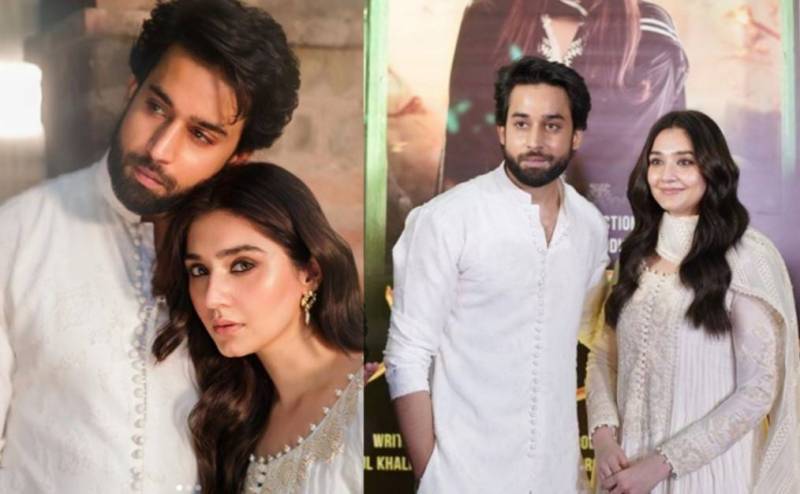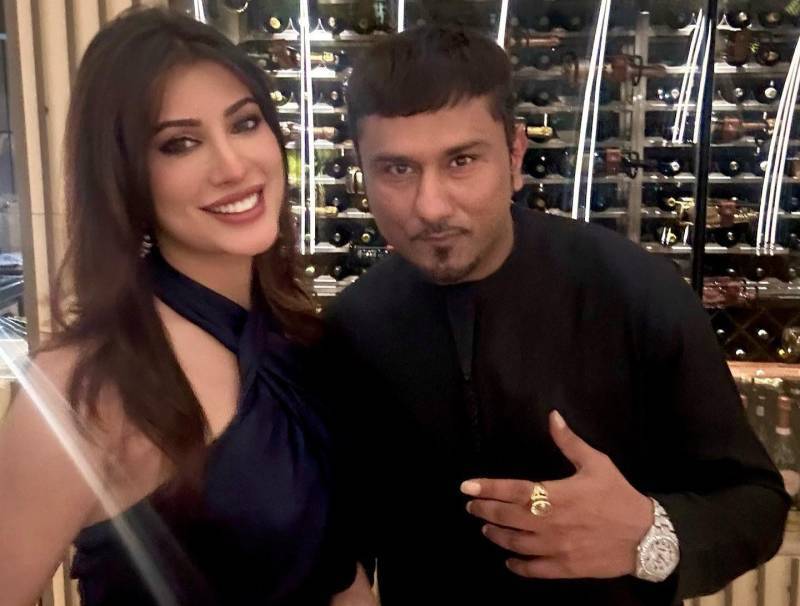Sporting an unconventional, laid-back ensemble comprising a white kameez paired with sneakers, complemented by a waistcoat that undeniably enhances the character's unique flair, Mahira steps into a fresh, inviting persona. Her aura strikes a balance between funky and free-spirited, while her conversational style skillfully avoids the common trap of becoming a didactic intermediary between the audience and the show's content.
Moreover, right from the outset, Mahira's storytelling persona fearlessly confronts the pernicious norms that have marred society's fabric. She kicks things off by addressing the issue of women's harassment, and in a twist of irony, when a man from the audience resorts to catcalling, she wields eloquent language to swiftly quell his impulsive impulses.
The storyline, centered around the birth and presumably the life of Razia, commences in 1997. The show's masterful cinematography transports us to a harrowing scene, with Saleem (played by Mohib Mirza) leaning against the wall outside a run-down hospital's operating theater. Inside, his wife (portrayed by Momal Sheikh) is in the throes of labor. The central conflict becomes starkly evident as Saleem is faced with a grim choice: saving his wife or their unborn child.
His sole concern is whether the child is a boy, and his sole request is to prioritize the life of a male child should such a dilemma arise. Back at their home, Saleem's mother eagerly anticipates news of a grandson's birth, only to receive a phone call bearing the news of the arrival of a daughter, accompanied by melancholic music underscoring the disappointment etched on the crestfallen faces on screen.
At this juncture, Mahira's storyteller character fearlessly interjects, questioning, "What have you achieved that you desire a male child to carry on your legacy?" She sheds light on the hypocrisy and lack of empathy displayed by those involved and complicit in this mindset, including mothers-in-law who have themselves endured the hardships of childbirth and child-rearing, only to subject their daughters-in-law to the same fate, transforming them into mere "baby-producing machines" in an unrelenting quest for a male heir.
In a spine-chilling moment, Mahira passionately underscores the stark reality that while in an era of widespread illiteracy, female infanticide was a prevalent practice, today, girls are allowed to live but are systematically stifled at every turn. Her declaration carries the weighty implication that the burden women bear is unlike any other, an unrelenting weight they must carry from birth to death, as it gradually buries them deeper into the very soil they tread upon.
This truth is powerfully illustrated when Saleem's mother laments the birth of her granddaughter, Razia. She enlightens him about the age-old patriarchal belief that reveres a son as a "father's right hand" while dismissing a daughter as a "load on a father's back." The irony, of course, lies in the fact that without the daughter's birth, that celebrated pillar of strength would never have existed in the first place.
This conversation brings into sharp focus how sons are regarded as investments and daughters as liabilities under the confines of man-made societal norms. The expendable nature of a woman's life becomes evident when Saleem's mother urges him to start attempting to conceive a son again, despite his wife's recent life-or-death ordeal.
Brilliantly filmed and conceived, the innocent gurgles of Razia are juxtaposed with Mahira's poignant voiceover, emphasizing how the mere existence of this harmless child simultaneously serves as a looming threat over her mother's head, with the sharp edge of divorce glinting menacingly at its tip. Another astute parallel is drawn between the superstitious rituals set in motion to ensure the birth of a son and the disregard for a doctor's advice to wait before attempting another pregnancy, all in tandem with Razia's story.
It's worth mentioning that Mahira's monologue is interrupted by the news of the birth of Saleem's son, Ali, after a three-year gap. For those three years, Razia played, pondered, and grew up in solitude, her birth shrouded in shame and isolation from her family. Ali's birth ushers in a change in the family's attitude and an outpouring of joy, starkly absent when Razia first came into the world.
In a wonderfully quirky twist of fate, Saleem's mother expresses a desire to hold Ali, only to pass away before she can do so. Accompanied by lively music, Mahira's voiceover delivers a humorous punch by suggesting that if the child had been another girl, she might have been branded a curse, blamed for snatching her grandmother's life.
A poignant scene follows, with Razia observing her father showering Ali with the love she herself never received, her face etched with a deep yearning. This pattern continues over the years, with the contrast in how the siblings are treated becoming increasingly pronounced as time goes on. Another layer of irony emerges when Razia is discouraged from competing with her younger brother. It's evident that while Ali was warmly welcomed into a seat at the family table, there was never a place set for Razia in the first place.
Towards the episode's conclusion, the audience is introduced to the one person in Razia's life whom she can truly call her own. Mannu, who lives just two streets away from Razia, enters her life as a catalyst for her to fulfill her modest desires. The heartbreaking aspect lies in the fact that Mannu, a male presence, must wrest away what rightfully belongs to someone else to create a space for young Razia to revel in stolen moments of happiness. Even her "acts of rebellion" are marked by a sense of innocence, such as asking questions, befriending Mannu, or collecting countless cola caps in the hope of winning the bicycle her father adamantly refuses to buy for her.
As the first episode draws to a close, Mahira sets the stage for the unfolding events, promising a gripping narrative that will challenge "fragile egos" while navigating its fair share of ups and downs. With its engaging blend of storytelling and narrative, complemented by a superbly talented cast, "Razia," even in just one episode, is shaping up to be essential viewing.














